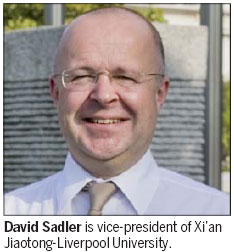Universal universities
Updated: 2013-04-12 08:26
By David Bartram for China Daily and Ji Xiang (China Daily)
|
|||||||||||
|
A professor does an experiment watched by his students in a laboratory of Xi'an Jiaotong-Liverpool University. Provided to China Daily |
Two British universities are experiencing success in China after establishing campuses there
As foreign universities build closer academic ties with China, a handful of institutions have established a mainland presence to capitalize on China's high demand for quality education.
The University of Nottingham became the first to open a foreign university in China in 2004 with a campus in Ningbo, about 200 kilometers south of Shanghai.
The university had already been looking to the Far East for several years. In 2000, it opened a campus in Malaysia and was also the first British university to appoint a Chinese national as chancellor, with physicist Yang Fujia assuming the role.

"Internationalization is a really important step for Nottingham," says Professor Nick Miles, provost and CEO of the university's Ningbo campus. "It wasn't a sudden decision, but for 10 or 15 years senior management has been working in this direction.
"This part of Eastern China made a perfect location. It has an outward, international feel."
The University of Nottingham Ningbo offers students an international education within China. The campus is standardized with the University of Nottingham, meaning that students receive the same degree with the same educational provisions.
"If you look at our campuses you cannot tell the difference between the degree certificate awarded at our China campus, our UK campus or our Malaysia campus. That says that the learning outcomes are the same. You are getting a British education and degree certificate in China," Miles says.
The popularity of this approach is reflected in the growing numbers of students, with more than 5,000 now enrolled. A student completing an undergraduate degree at the Ningbo campus can expect to pay roughly half that of a student studying in the UK, accounting for tuition and living costs. There is also the opportunity for students to move between campuses.
Since the Ningbo campus opened, Nottingham University's reputation has grown in China, and the number of Chinese students studying at the university's UK campus has risen.
"I think in China, if you go out on the street and ask people about Nottingham University, they will generally have heard of us. Our reputation is really second only to Oxbridge in China now," Miles says.
Another British institution, the University of Liverpool, has taken a slightly different approach to China. Rather than opening a China campus, the university partnered with Xi'an Jiaotong University in 2006. Xi'an Jiaotong-Liverpool University is based in Suzhou, adjacent to the Shanghai municipality and home to one of Europe's oldest established Chinese communities. The university builds upon Liverpool's close ties with China.
"There have always been strong links between Liverpool and China," says David Sadler, vice-president of XJTLU. "The university has been involved in joint research projects in China for many years. XJTLU was the next part of the university's internationalization agenda.
"The structure of XJTLU is different to other international universities in China. We are a true joint venture with two equal partners. Our undergraduates get both a Liverpool University degree and a Chinese degree. That's unique in what other universities are doing at the moment."
Like Nottingham Ningbo, XJTLU has grown quickly since it was established. Beginning in 2006 with 160 undergraduates, it now boasts 6,000 students, making it the largest international university in China. There are also about 1,600 XJTLU students studying in Liverpool.
"Liverpool's standing in China has improved enormously as a result of this joint venture," Sadler says. "As one of a small number of international joint venture universities, we are obviously very much in the spotlight.
"We are recognised widely in China as a new kind of university and this reflects well on Liverpool. One of our central selling points is the chance to have an international style education in China."
The two universities have become popular choices among Chinese students because many employers in China are more apt to recruit graduates with an international perspective. Miles urges other British universities to follow their lead.
"The UK is up there punching above its weight in terms of higher education. It is in line with the US, but the US is moving strongly," says Miles. "New York University is opening in Shanghai, Duke is planning to move into China. Other countries are getting the energy behind them and wanting to engage.
"Competition is huge but opportunities are vast, too."
Though the University of Nottingham and the University of Liverpool have had undoubted success in China, not all British academic institutions regard their experience as worth emulating.
"We have no plans to open any overseas campus at any point in the foreseeable future as it doesn't suit a university of our size. We are always interested in meaningful cooperative activities and with China we have several," says David Tumilty from the School of Oriental and African Studies at the University of London.
The London Confucius Institute at the University of London was set up in cooperation with the Chinese National Office for Teaching Chinese as a Foreign Language (more widely known as Hanban). It links SOAS with Peking University in developing exchanges in culture, language and research. SOAS also currently works with Beihang University, Guangdong University of Foreign Studies and Zhejiang Normal University in offering a dual master's degree in linguistics.
"We will be considering other opportunities in China, but these will likely fall within the areas of joint programs, research collaboration and student/staff exchanges," Tumilty says.
Zhang Lan Lan, an education expert in China, says more and more Chinese parents want their children to receive a Western-style education as early as possible, so many enroll their children at the Beijing New Oriental School, a private institution in the capital. Many hope to send their children abroad for high school and eventually to a Western university.
Contact the writers through jixiang@chinadaily.com.cn
(China Daily 04/12/2013 page15)
Today's Top News
List of approved GM food clarified
ID checks for express deliveries in Guangdong
Govt to expand elderly care
University asks freshmen to sign suicide disclaimer
Tibet gears up for new climbing season
Media asked to promote Sino-Indian ties
Shots fired at Washington Navy Yard
Minimum growth rate set at 7%
Hot Topics
Lunar probe , China growth forecasts, Emission rules get tougher, China seen through 'colored lens', International board,
Editor's Picks

|

|

|

|

|

|






